Introduction: In this article, Melissa Davenport Berry continues her series about the founders of Nantucket, Massachusetts, and their descendants, focusing on Mary Coffin Starbuck. Melissa is a genealogist who has a blog, AnceStory Archives, and a Facebook group, New England Family Genealogy and History.
Today I continue with my series on the sons and daughters of the founders of Nantucket, Massachusetts. Among the surnames are Macy, Coffin, Starbuck, Hussey, Gardiner, Bunker, Folger, Coleman, Swain, and Mayhew.
To recap: My last story covered the monument dedicated to the men who founded Nantucket. Also, I wrote about the dominant influence of the Quaker sect which gave women equality. See: Scions of Nantucket Founders (part 1).
In 2009 a monument was unveiled to honor the wives of these founders, whose power and influence was just as instrumental as their male counterparts.
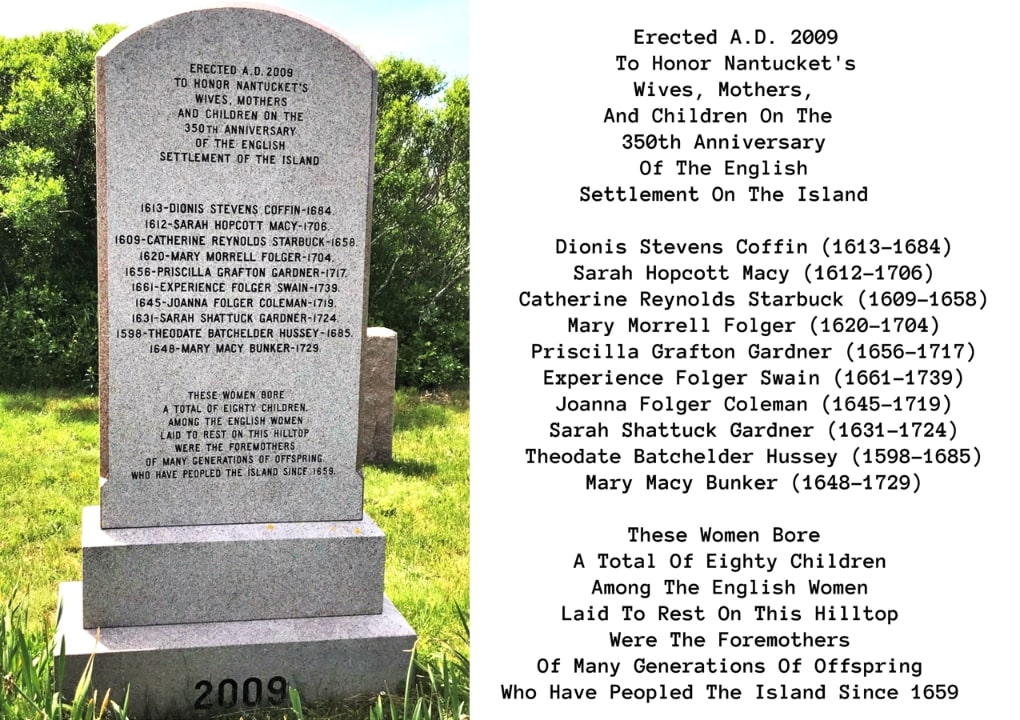
Once again, historian and “Flying Santa” Edward Rowe Snow serves up some great tidbits on the subject.
His “Nantucket Ladies,” a featured piece in his historical column “Sea and Shore Gleanings” published in the Patriot Ledger, asserts that:
Without question no other island area in America the size of Nantucket has produced so many remarkable women.
Among them were noted mathematicians, merchants, astronomers, abolitionists, philanthropists, suffragettes, and reformers, all bred from the names chiseled on the Nantucket founders’ monuments.
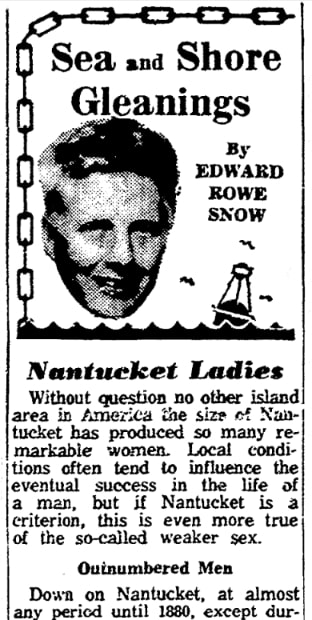
Snow provides a compelling example of one of the first lady lionesses that proved to be remarkable.
Mary Coffin Starbuck (1645-1717), the seventh child born to Nantucket settlers Tristram and Dionis (Stevens) Coffin, was a mighty colonial dame.
She married Nathaniel Starbuck, son of Nantucket settlers Edward and Katherine (Reynolds) Starbuck. They left many descendants which I will cover in future stories.
Here is what Snow writes on Mary:
Becoming increasingly noted for her unusual gifts of mind and character, Mary assumed such an important position in the community that her advice was often sought. She was a woman of exceptional intelligence. She took an active part in town affairs and was regarded as a leader and judge.
In 1701 she adopted the religious faith of the Friends [Quakers]. The first meeting of this society was at her house, and the Friends continued to meet there for the next four years. The house stood on what is now known as the W. R. Swain farm and was called the Parliament House.
Here is a photo of the Parliament House in Nantucket. An unidentified woman is standing in front. The house was dismantled, then reassembled and moved to its present location from a site next to Hummock Pond, where it was built for Nathaniel and Mary Starbuck around 1676.
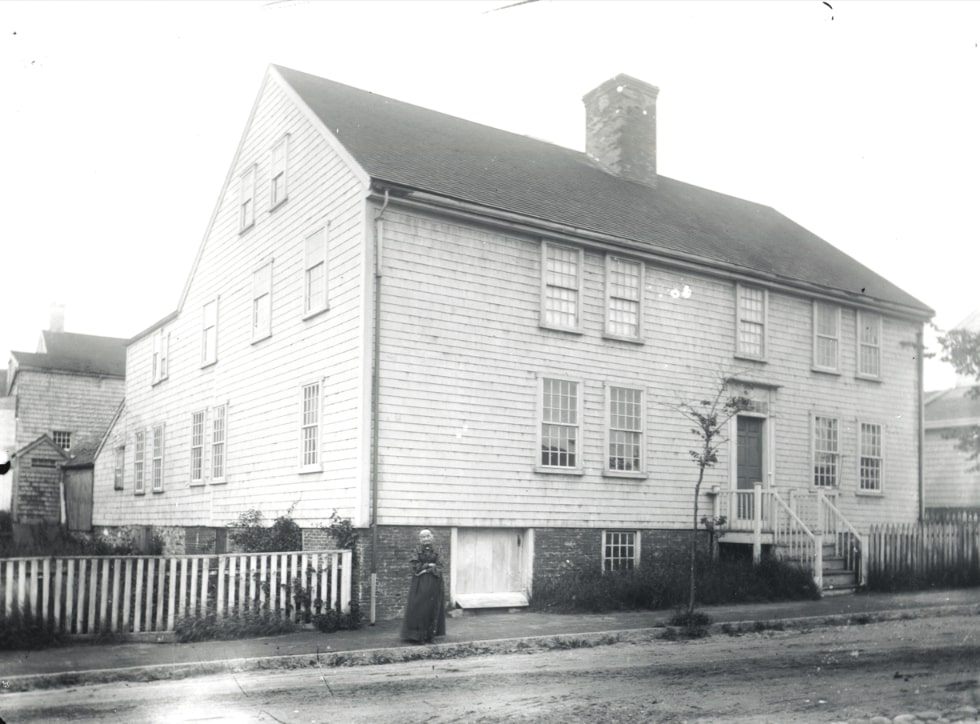
Snow concludes with the following on Mary:
Although she followed the prevailing 17th Century ideas on women’s place and never gave an opinion without modestly prefacing it with “my husband and I think,” her husband meekly took the part of consort.
Known as the “Great Woman” of Nantucket, whenever she spoke out at meetings Mary left her hearers spellbound. The “Oracle” of Nantucket died in 1717. Historian William O. Stevens says that when she passed away her place as the uncrowned queen of the island was never filled. But there were many other women who have impressed us with their unusual accomplishments.
Housed at the Nantucket Historical Association is the account book of Mary Coffin Starbuck, which includes members of the Wampanoag community.
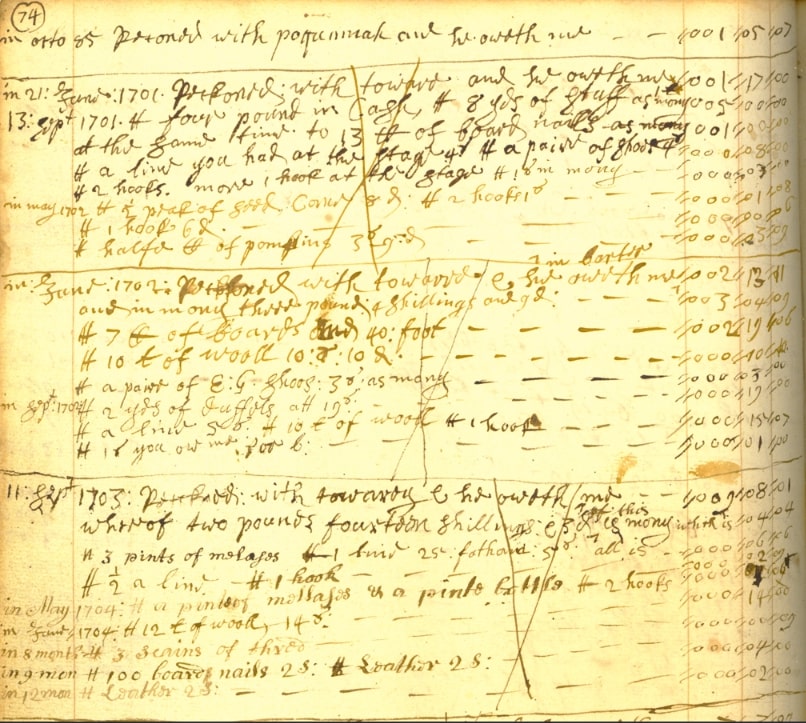
Mary was the first storekeeper on the island. While she operated a thriving retail enterprise and trading post, her husband Nathaniel invested in the whaling industry. The power couple built an empire.
I found another article about Mary Coffin Starbuck entitled “Our First Suffragette” and published in the Evening Star. It was written by Margaret Townsend.
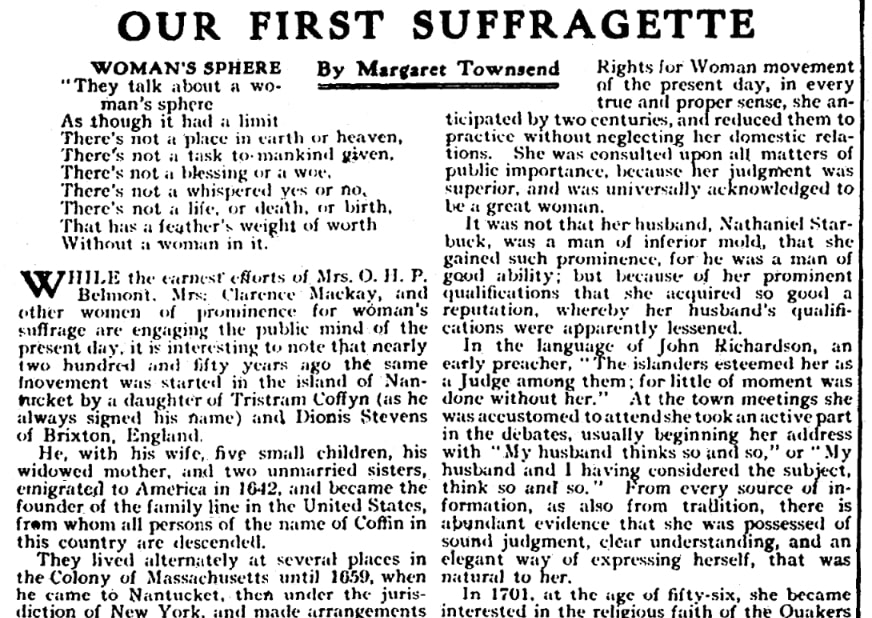
Townsend’s assessment of Mary’s remarkable judgment aligns with Snow’s, but she adds more detail:
Mary Coffin Starbuck developed into an extraordinary woman, participating in the practical duties and responsibilities of public gatherings and town meetings, on which occasions her words were always listened to with marked respect.
The genius of whatever attaches to the Equal Rights for Woman movement of the present day, in every true and proper sense, she anticipated by two centuries and reduced them to practice without neglecting her domestic relations. She was consulted upon all matters of public importance, because her judgment was superior, and was universally acknowledged to be a great woman.
Townsend cites English Quaker minister John Richardson, who visited the island, preached at Mary’s home, and witnessed Mary’s exceptional proficiency. He stated:
“The islanders esteemed her as a Judge among them; for little of moment was done without her.”
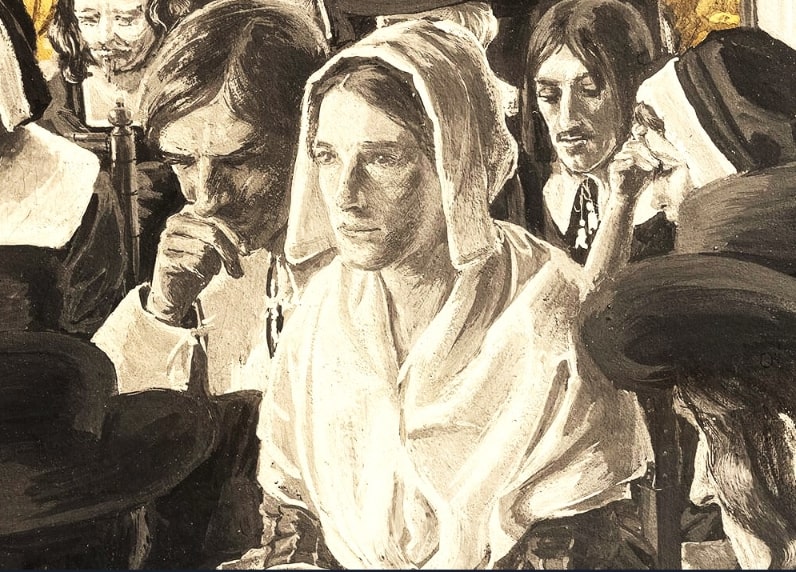
Townsend writes of Mary’s interest in the Quakers:
In 1701, at the age of fifty-six, she became interested in the religious faith of the Quakers and took the spiritual concerns of the whole island under her special superintendence. She held meetings at her own house, which are often alluded to by visiting Friends who have written concerning the island’s early religious history, wrote the quarterly epistles, and preached in a most eloquent manner, and withal was as distinguished in her domestic economy as she was a celebrated preacher.
Townsend again cites Richardson’s words to describe his visit to preach at Mary’s home. He praises her ability to cultivate an egalitarian atmosphere, a significant principle of the Quakers. However, it sounds like she may have put her foot down when it came to propping up the preacher!
“The order of her house was such in all the parts thereof as I had not seen the like before. The large and bright rubbed room was set with suitable seats or chairs for a meeting, so that I did not see anything wanting according to place, but something to stand on, for I was not free to set my foot upon the fine cane chair, lest I should break or soil it.”
And if you are wondering where Mary got all her moxie – why I believe it was from her mommy! Check out my story on how Dionis Coffin beat the magistrates in the beer industry: Something Old, Something New – By God’s Grace, We Will Always Have Brew!
To be continued…
Explore over 330 years of newspapers and historical records in GenealogyBank. Discover your family story! Start a 7-Day Free Trial
Note on the header image: flag of Nantucket, Massachusetts. Credit: NuclearVacuum; Wikimedia Commons.
Related Article:
